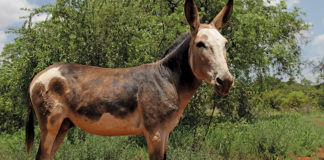But, as Mike Burgess reports, changed mindsets are needed, such as adapting modern production techniques, trading in weaners as opposed to older cattle and offering better- conditioned animals. No-one knows exactly how many cattle are run by “cultural farmers” (as the E astern Cape agricultural MEC Gugile Nkwinti refers to them). Gerhard Schutte, CEO of the National Red Meat Producers’ O rganisation, says over 50% of all stock in the Eastern Cape belong to communal farmers, while he puts the national figure at 40%.
Land used to run these cattle extensively can be anything from vast tracts of communal land in the former homelands, commercial farms managed by land reform beneficiaries, to numerous municipal commonages around small platteland towns. With such a huge untapped resource, efforts are being made to get these animals absorbed into mainstream marketing channels.
Many of these efforts are coming up against certain obstacles such as getting cultural farmers to invest in modern production techniques, changing the cultural perception that older cattle should be sold when commercial markets require weaners, and, of course, the perennial problem of land. It’s a problem that has played itself out over centuries, with the last really successful intervention being orchestrated by various mission churches operating the Eastern Cape in the mid- to late 1800s.
In The Rise and The Fall of the South African Peasantry, Prof Colin Bundy maps out what amounted to nothing less than the economic revolution of peasant farmers after modern farming techniques were introduced to traditional farmers by missionary- founded institutions. The institution that has continued these successful efforts is the University of Fort Hare, where the animal-traction unit and Nguni cattle project have achieved international acclaim for maximising the efficiency of traditional agriculture. But the challenge remains the same as in the 1800s: getting communal farming to compete successfully in the mainstream market.
A helping hand for communal farmers
Today, assistance for Eastern Cape communal farmers comes in the form of British-funded NGO ComMark, which strives to give traditional producers access to mainstream markets. “Visits are arranged to abattoirs to witness the grading and classification of red meat,” says Dr Xolile Ngetu, project manager of ComMark Trust Eastern Cape Red Meat Project, which focuses in the Peddie area of the province. ” Commercial auctions are also visited to introduce communal farmers to the intricacies of this new market.” Furthermore, practical and theoretical training in veld management, branding, weaning, dehorning, castration, supplementing, disease prevention, selection processes and the creation of breeding seasons are also provided. Pooling cattle for communal auctions also exposes traditional farmers to the buying needs of mainstream markets.
It is through a partnership with Pfizer that ComMark is tackling the marketing of communal cattle. The Pfizer Weaner Improvement Programme is attempting to get cultural farmers to produce and sell weaners that are better conditioned and treated so that they are able to withstand the stress of transport andfeedlots.
“Prized” oxen go for a song
In an attempt to convince communal farmers of the value of selling younger cattle, a communal sale was held on 7 June at Lover’s Twist near Peddie under the auspices of Cape Mohair and Wool’s BEE component, Siyathemba AmaFama. Trading in weaners is unusual within the informal communal market, with mostly older cattle, specifically large oxen, being sold. The benefit of marketing weaners, says Leonard Fletcher, area sales manager for Pfizer, is that turnover is increased, management costs and risk are decreased and reduced stock numbers allow veld to recover. At the auction, however, communal farmers came face to face with the reality of the market: prized oxen often barely fetched double the price of a weaner. The reaction ranged from outrage to confusion.
Fletcher admits that marketing is but one aspect needing attention. Managing communal grazing, sound fencing regimes and proper branding procedures are also desperately needed if traditional farming is to take its rightful place. But the state’s involvement is also required. The lack of infrastructure, such as loading ramps, was illustrated at the auction: one animal suffered a broken leg, another had a ripped udder and animals suffered other minor injuries after being forced on and off lorries funded by ComMark. The stress that these animals suffered should not be underestimated.
Organisations taking the lead
The auction coincided with the National Emergent Red Meat Producers’ Organisation’s (Nerpo) 10th anniversary celebrations, which were held near Peddie, and it was here that land issues facing communal farmers came to the fore. Hosted by Nerpo affiliates the Eastern Cape Emergent Red Meat Producers’ Organisation, the Eastern Cape Department of Agriculture and the Amatola District Municipality, the celebrations were emblematic of how private-public partnerships are essential in improving communal and emerging beef production, but also how often the state can slow down development.
Faith and hope in government
It was clear that the farmers attending had high hopes of the state, with expectations ranging from education, fencing and veterinary support, to (importantly) genetic improvement schemes. “The MEC of A griculture (Gugile Nkwinti) is the father of cattle farming,“ says Nimrod Wilkinson Mahlubini Sipuka, a prominent emerging cattle farmer on the Peddie coast area and a Nerpo member. Nkwinti did promise farmers support, such as the establishment of new training facilities, while Aggrey Mahanjana, the group managing director of Nerpo, emphasised the importance of co-operation between communal and emerging farmers and local government to ensure the growth of communal and emerging beef production.
More land, more farming
But it’s on the issue of land that things seem to come unstuck. Many communal farmers regard productive land reform along the fringes of communal areas as the only way to make the successful transition from communal to commercial cattle farming, a view that often has a historic twist. “The Frontier Wars were fought over a period of 100 years for the sole purpose of protecting land from the invaders. We salute our forefathers for their patriotism,” Sipuka told the assembly, underlining the fact that issues in this part of the country haven’t changed for hundreds of years. It’s still about access to land on which to run cattle, as it was 100 years ago. Emotion is inflamed by an appreciation of the injustices of the past, but the efforts of the Eastern Cape Department of Land Affairs have not helped soothe frustrations.
EC government inefficiency
In the Peddie area alone, for example, three farmers have been unable to get title to their land, despite years of trying. Sizwe Manjezi, a respected Bonsmara stud farmer and a true black commercial farmer, is probably the best example. He has been trying since 1994 to get title to his 800ha farm outside Peddie. Manjezi has invested considerable amounts of his savings, accumulated during a teaching career that began in themid- 1900s, into the land, but is still unable to access credit without title. “I have invested heavily, I am not going to start living in a shack now,” he says. In response to Manjezi’s frustrations, Daliwonga Matta, chief director of the Eastern Cape Land Reform Office, quotes complications with the subdivision of land in the former homelands, troublesome private- property owners, and even the rights of a British rubber company.
“Options of expropriation are now being considered to speed up the process,” he says, without giving an explanation of why Manjezi has not been granted title to his land in almost 15 years. “Somebody is simply not doing their job and as a result I’ve been inconvenienced for many years.” An embarrassed Nkwinti says “I am shocked. I thought the matter would have been resolved by now as we’ve taken it up with Land Affairs. It’s out of order.” Manjezi is exasperated by politicians. ”Government says we must not be politicians, but these issues are political. So what should we do?” he asks. Contact Dr Xolile Ngetu on 083 532 4435 or Leonard Fletcher on 082 826 6526.












